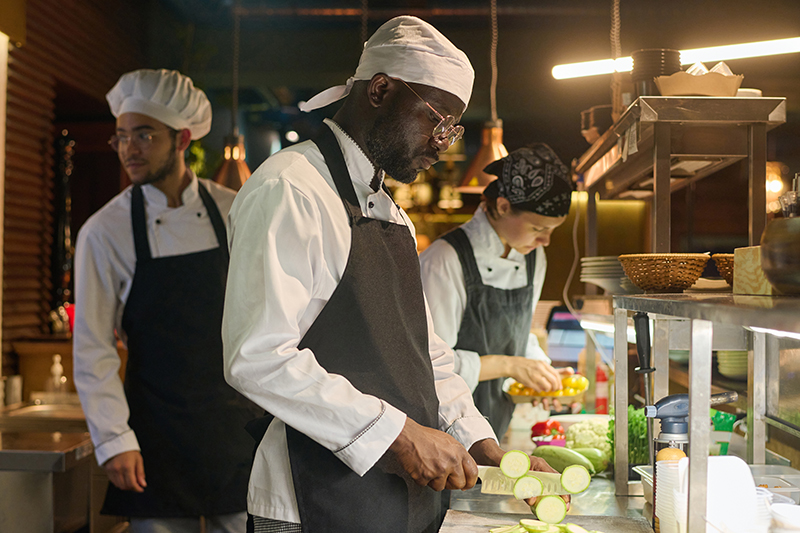Author: Kaya Stanley, Board Chair and CEO, CRMBC
The restaurant industry in California is navigating some of its toughest challenges in recent years, particularly with the introduction of the $20/hour minimum wage for fast food chains of more than 60 locations. This change has led to a cascade of operational challenges for many operators, from increased payroll expenses to heightened employee expectations. In a recent CRMBC Self Insurance Podcast episode, Lisa Nilmeier, Chief Administrative Officer and General Counsel for Milano Restaurants International shared her insights on how her team is adapting to these evolving demands.
The Impact of Minimum Wage Increases
Lisa, who oversees a diverse portfolio of more than 60 multi-branded restaurants under Milano Restaurants International, spoke candidly about the difficulties posed by the recent wage hike.
“We’ve been struggling for so many years with the onslaught of annual wage rate increases and new government regulations. We finally emerge from COVID, which in itself was such a huge challenge for our communities, we just get our legs back under us, and then WHAM, $20 an hour”, she shared.
This significant wage increase has particularly challenged the restaurant industry, where many employees are first-time workers. Lisa highlighted the ripple effects, noting how it drives up payroll costs and creates wage compression issues where experienced managers expect higher pay, putting further strain on the business. “It’s just this very odd dynamic right now. It is truly understandable that minimum wage does not support the cost of living in this state, but our government officials are not addressing the public policy and legislation that got us here in the first place. Think gas taxes, think utility crisis, think inflation. The minimum wage increase just exacberates these problems, but our government is not addressing the root of the problem. I just don’t know what to expect… how much more will people pay for a pizza, a tank of gas, a sandwich, or a power bill?” she questioned.
Adapting to the New Labor Landscape
In response to these challenges, Milano Restaurants has begun to rethink its hiring practices. “We need to be a little more attentive to who we’re hiring now,” Lisa noted. Historically, the company hired many first-time employees, but with the new wage pressures, there’s a growing need to be more selective. This shift also involves retraining managers to focus on the hiring process, ensuring new employees align better with the company’s evolving needs.
“We continue to introduce more tools to help our GMs hire, train and retain more efficiently to keep our almost 60-year culture of teamwork, quality and service alive,” Lisa explained. This proactive approach is aimed at reducing turnover, which is notoriously high in the restaurant industry, and ensuring that new hires are capable and committed to long-term success within the company.
The PAGA Challenge
Beyond wage issues, Lisa also discussed the ongoing challenges related to Private Attorneys General Act (PAGA) claims, a significant concern for California employers.
“We’ve associated it with what happened during COVID… the environment was completely different,” she noted, highlighting that the rise in complaints has continued to place additional pressure on businesses.
Lisa pointed out the irony in these lawsuits, stating, “The plaintiffs in the case don’t really get the money. It all goes to the lawyers.” This sentiment underscores the ongoing disconnect between PAGA’s intended purpose and its actual impact. Recent PAGA reforms, signed into law by Governor Newsom on July 1, 2024, aim to relieve workers and businesses. The new reforms streamline the litigation process, cap penalties for employers who act promptly to address violations, and increase the percentage of penalty money allocated to employees from 25% to 35%.
A Hands-On Approach to Workers’ Comp
Another critical area where Milano Restaurants has taken a proactive stance is workers’ compensation management. As a workers’ comp self-insured group member, Lisa emphasized the importance of early intervention in injury claims. “We are very hands-on from senior managers down. We do not take it lightly at all,” she said.
The group’s strategy includes immediately reporting injuries and maintaining close communication with adjusters to ensure claims are handled efficiently and fairly. “It’s been really helpful to have that sort of direct connection instead of going through all the steps,” Lisa added. This approach helps manage costs and ensures that employees receive the care they need promptly.
Looking Ahead
As the California restaurant industry continues to navigate these complex challenges, the experiences of leaders like Lisa Nilmeier provide valuable insights. By adapting to wage pressures, proactively managing legal risks, and maintaining a hands-on approach to workers’ comp, Milano Restaurants sets a strong example for others in the industry.
For more insights and strategies from industry experts like Lisa, subscribe to the CRMBC Self-Insurance Podcast. The knowledge shared in these discussions could significantly improve your restaurant’s ability to navigate California’s ever-changing labor and insurance laws. If there are any specific topics you’d like us to cover in future episodes, please email us at info@CRMBC.com.

Kaya Stanley is an attorney, published author, business owner, and highly sought-after strategic turnaround expert. Ms. Stanley serves as CEO and Chairman of the Board for CRMBC, the largest restaurant workers’ compensation self-insured group in California, and she is the Licensee for TEDxReno, an independently organized TEDx Event.
Throughout her 22 years of practicing law, Ms. Stanley has served as outside counsel for Wal-Mart and Home Depot. She was voted one of the country’s “Top 25 OZ Attorneys” by Opportunity Zone Magazine and published a best-selling book called “The Employer’s Guide to Obamacare.” Before that, she earned her master’s degree in social work and public policy, after which she worked with at-risk girls in Detroit and lobbied for women and families.








